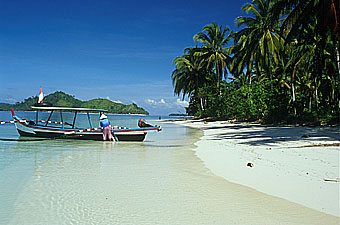For more than two decades, I had been eager to visit the four remote and tiny Mentawai Islands off the west coast of Sumatra. They were a priority focus for the World Wildlife Fund in the late 1970s and early 1980s, and a national park was established on Siberut in 1993. Since then, the islands have been largely ignored by the major conservation organizations.
This spring, Conservative International (CI) Executive Vice President Gustavo Fonseca, Regional Vice President for Indonesia Jatna Supriatna, and I visited the Mentawais and found a rich variety of endemic wildlife species and a fascinating but disappearing indigenous human culture. In many ways, these islands are an Asian version of the famed Galapagos and should be considered for World Heritage status.

Most striking are the primates, which include an amazing eight endemic species. The most interesting is the pig-tailed langur (Simias concolor), a very strange animal that is listed as Endangered on the IUCN Red List. It is the only leaf monkey with a short, curly tail, and has a small, upturned nose like the golden or snub-nosed monkeys (Rhinopithecus) of China and Vietnam.

In all, there are at least 16 endemic mammal species on the islands, more than are found on the entire main island of Sumatra, which is some 67 times larger. The reptiles, amphibians, and fish of the islands are poorly known to science, and invertebrates even less so. The Mentawais are prime candidates for a major CI Rapid Assessment Program expedition, in which animals and plants will be intensively surveyed by CI and our partner scientists.

The indigenous people of the Mentawais, and especially Siberut, the largest of the islands, are equally fascinating. They belong to one of the most ancient cultures in Indonesia, and until recently, trod lightly in the forests that nurtured them. However, as their small, widespread, low-impact clans have been consolidated into larger settlements by the government, many of their traditional taboos against exploiting forest resources are being lost.

The Mentawai rely heavily on primates as a source of protein. Their growing settlements and increasing population mean that primatesand many other unique wildlife speciesare in greater danger from unsustainable hunting. Survival of these species, and perhaps of the indigenous Mentawai peoples themselves, will require alternative sources of protein, such as increasing domestic pig-raising and fishing capacity.
Siberuts national park, established more than a decade ago covers about 40 percent of Siberut and is the only protected area on these islands. Unfortunately, heavy and unsustainable logging continues throughout the Mentawais, and the ecology of one of the most interesting and important island systems on Earth is being seriously impacted. The widespread timber cutting is analogous to draining part of the Florida Everglades to plant sugarcane.
CI is encouraging leading Indonesian conservation figures and government authorities to reverse the situation and require logging in a more responsible manner. With the Mentawai, we will also explore ways to help develop ecotourism in the area, and launch scientific assessments to determine the state of wildlife resources and the remaining forest cover.
Its ironic that these priceless crucibles of biodiversity, spared by the tsunami of 2004 that devastated Sumatras northwestern coast, now face irreparable harm from the timber trade. Our initial efforts to help protect the islands natural resources include a major financial commitment through the Critical Ecosystem Partnership Fund. We are supporting several partners including the German Primate Center, which has a major effort underway in one of Siberuts most valuable conservation areas.
Just as we protect other islands of endemism like Madagascar, the Galapagos, and New Caledonia, CI and its partners are dedicated to helping the Mentawais preserve their natural heritage.
By Russell A. Mittermeier www.conservation.org
Cek berita, artikel, dan konten yang lain di Google News












